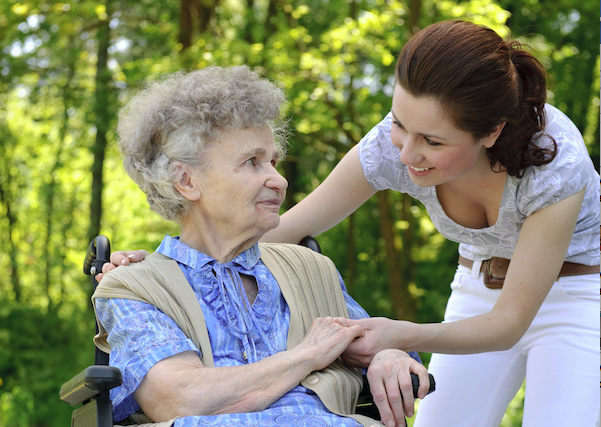 Older adults can count on a lot of support in West Hollywood when it comes to health and certain community services. For example, the city contracts with Jewish Family Services (JFS) to operate the West Hollywood Comprehensive Service Center in Plummer Park, where seniors can get help finding everything from meals to psychotherapy to making sense of their government benefits. The city also is a sponsor of the JFS’s SOVA program, which provides free groceries to those in need. And it supports the L.A. LGBT Center in providing services such as psychotherapy and STD tests.
Older adults can count on a lot of support in West Hollywood when it comes to health and certain community services. For example, the city contracts with Jewish Family Services (JFS) to operate the West Hollywood Comprehensive Service Center in Plummer Park, where seniors can get help finding everything from meals to psychotherapy to making sense of their government benefits. The city also is a sponsor of the JFS’s SOVA program, which provides free groceries to those in need. And it supports the L.A. LGBT Center in providing services such as psychotherapy and STD tests.
But West Hollywood is a city where 15% of the population is 65 or older and 51% of those over the age of 65 have a disability, and the percentage of adults 65 and older is likely to grow. Also a proportion of the elderly population consists of refugees from Russian-speaking countries who need attention that addresses their special needs. And given that 40 percent of the city’s population identifies as gay, the city has a higher incidence of older residents with HIV/AIDS than other cities its size.
For those reasons, health and community services is one of eight key focuses on the city’s “Aging in Place / Aging in Community” strategic plan. Development of the plan, currently being reviewed by city boards and commissions and other groups for feedback, is directed by Elizabeth Savage, director of the city’s Department of Human Services and Rent Stabilization. She hopes to have the city implement the five-year strategic plan next year.
Others elements of the plan are housing, open space and buildings, transportation, respect and inclusion, communications and information, civic participation and employment and social participation. This article is the sixth in a series that describes each of the eight elements of the proposed aging in place strategy.
The draft strategic plan lists four priorities under the health and community services category:
CARE FOR THE CAREGIVERS
Priority 1 Goals:
- Train the staff of non-profit social service agencies on how to advise family members and other caregivers on finding respite care for older adults.
- Create a campaign to celebrate the work that caregivers do.
- Offer various types of support or case management (planning for future support needs, coordinating care among various providers, dealing with benefits providers) to family members and friends trying to care for a senior resident.
- Train caregivers in how to provide the help an older person needs and also deal with the stress such situations create.
PHYSICAL AND MENTAL WELLNESS
Priority 2 Goals:
- Work with social services agencies to offer regular health testing through city-funded health fairs and in collaboration with Cedars-Sinai Medical Center.
- Coordinate care and services offered by different providers by using the “health neighborhood” model currently being used in Los Angeles. Under this model seniors are screened for medical, mental health and substance abuse issues and referred to appropriate care providers who continue to coordinate with the health neighborhood services provider.
- Encourage healthy exercise and habits that will prevent illness.
- Find and engage older adults who are isolated or homebound or in an institution, with a special focus on LGBT older people who may be coming out.
- Train doctors and other health care providers in the needs of older adults, including those who are LGBT or who are part of the city’s Russian-speaking population.
SOCIAL AND EMOTIONAL SUPPORT
Priority 3 Goals:
- Support services offered by groups such as Jewish Family Services, Being Alive, The Village that encourage older adults to support one another.
- Engage neighbors and others such as religious groups, young people and other volunteers with isolated older adults.
- Provide planning for the future such as wills and trusts, financial literacy and durable powers of attorney.
HELP IN THE HOME
Priority 4 Goals:
- Help older adults with services tailored to meet their needs as they move through various stages of growing older.
- Help with the process of obtaining in-home support.
- Make sure older adults have access to nutrition services and grocery stores.
- Provide help with basic household needs such as changing sheets, basic cleaning.
- Work with businesses to develop a directory of goods and services that can be home delivered.
- Explore options to provide shared services or group purchases to hold down the costs of groceries and other supplies.
- Develop a WeHo-specific model to offer hands-on help to frail older people.
Previously: Civic Information and Employment
Tomorrow: Social Participation

old?….gay?…..need assisted living or a GLBT friendly retirement
home…..? I guess it’s time to leave West Hollywood….
What a shame.
Just when community is most needed.
The section on caregivers is very interesting. I think that two things need to be added to their list. First, IHHS (In home supportive services) is a provision of Medi-cal that provides in home personnel for cooking, cleaning, shopping, etc. Seniors frequently need assistance in interviewing workers before they ‘hire’ them. Frequently, people get afraid not to take the first person they see as they are not certain when another might have availability to take them on. Second, and most importantly, there needs to be some sort of monitoring done as it has been my experience that some of the… Read more »